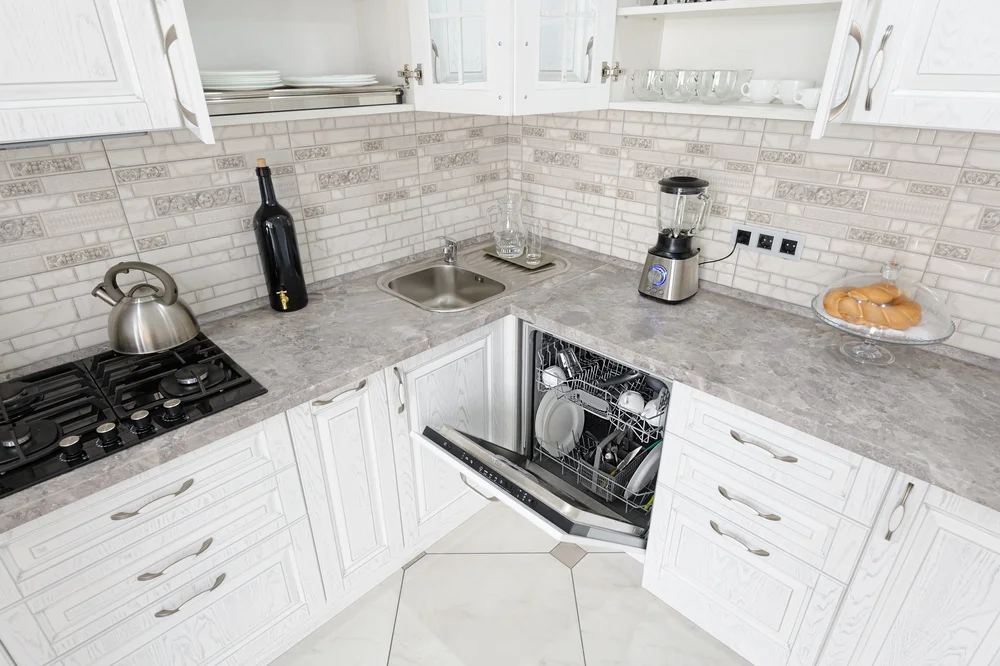You may have noticed that there is still water in the bottom of your dishwasher after running a cycle. This is not so much of a problem with your drain, but more of a lack of regular cleaning and maintenance of your dishwasher. If you’ve recently moved into a new home or completed plumbing installation in Calgary, it’s important to ensure that your dishwasher setup was done correctly and that all components are working as intended. You may be tempted to grab a bottle of drain cleaner for a quick fix, but this would be a big mistake. Never pour commercial drain cleaners into your dishwasher.
The chemical cleaning agents in commercial drain cleaners can damage internal components such as the pump, seals, hoses, and other plastic parts. The leftover chemical residue can contaminate your dishes and cause symptoms such as nausea, vomiting, and burns to the mouth and throat. Fumes from the cleaner are also harmful to inhale and can irritate the skin. A commercial drain cleaner can be both harmful to your health and to the lifespan of your dishwasher. Some ingredients in commercial drain cleaners to avoid in home appliances:- ❌Sodium Hydroxide – also known as lye – is a caustic alkaline substance that dissolves grease and hair. If ingested it may cause chemical burns and in some cases blindness.
- ❌Hydrochloric Acid – also known as muriatic acid – breaks down organic material in drains so that they can be easily flushed away. This corrosive substance may cause burns to the eyes and skin.
- ❌Sulfuric Acid – is a highly corrosive and hazardous chemical that breaks down material so it is more easily flushed. However this acid may cause damage to metal pipes and parts and can cause dangerous fumes when mixed with other chemicals.
- ✅Vinegar – this pantry staple will clean and deodorize without damaging your dishwasher or plumbing parts. The active organic ingredient in vinegar is ethanoic acid (acetic acid) which will remove built-up grime and grease. Just place one cup of vinegar on the top shelf of an empty dishwasher and run a full cycle.
- ✅Baking Soda – also known as sodium bicarbonate – is a natural cleaning agent which will help remove stains and freshen up the interior. Just sprinkle one cup of the powder all over the base of an empty dishwasher and run a hot water cycle. To clean the seal around the door of the dishwasher, combine baking soda and water into a paste and apply to the seal with a soft bristle brush. Let sit for roughly 15 minutes and then wipe off with a cloth dipped in soap and water.
- ✅Lemon Juice – is a natural and organic cleaner and deodorizer. To freshen up the dishwasher, mix a cup of lemon juice and a cup of water and pour into the base of the empty dishwasher. Run a cycle. If you have lemons but no lemon juice, cut one or two lemons into wedges and place in the bottom base of the dishwasher and run a cycle.
💎A few tips to remember for your next dishwasher clean
- Scrub or wipe the seal around the door with a baking soda/water paste. Leftover food particles can accumulate here and lead to foul odors and compromise the seal’s effectiveness.
- Remove the filter above the drain and clean out by rinsing with warm water in the sink.
- Use soap and water and a cloth or sponge to wipe out the interior walls and door of your dishwasher.
- Spray arms can be detached and rinsed in the sink to remove any leftover food particles.
- The final step is to run a cycle in an empty dishwasher with store-bought dishwasher detergent or one of the home remedies stated above.

Morgan Harper
BUSINESS SOLUTIONS MANAGER
Morgan is the Business Solutions Manager for Harper’s Plumbing. With a Bachelor of Commerce and an MBA from the University of Calgary, she combines her business expertise with hands-on industry knowledge. As the wife of a plumber, Morgan has gained invaluable insights into plumbing and home maintenance, making her a trusted voice for practical advice and solutions.





